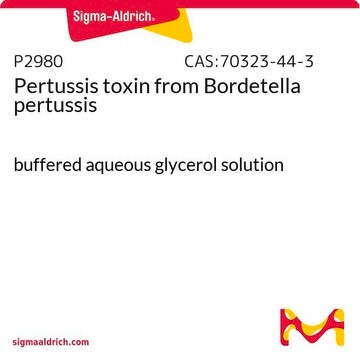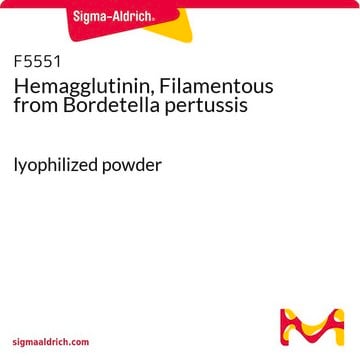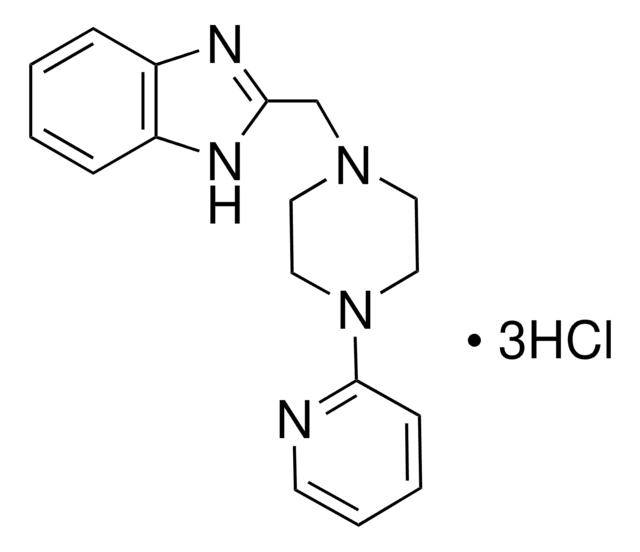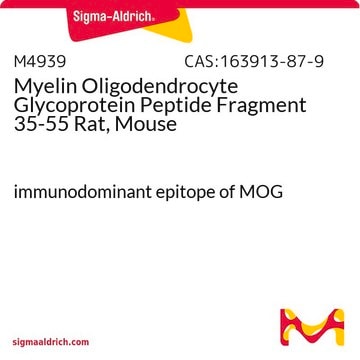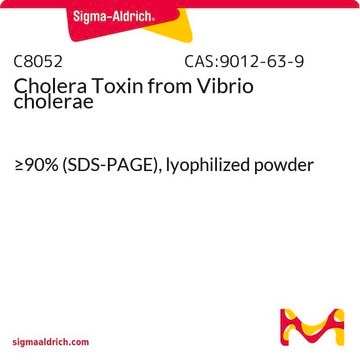SAE0066
Adenylyl Cyclase Toxin from Bordetella pertussis
Iniciar sesiónpara Ver la Fijación de precios por contrato y de la organización
About This Item
UNSPSC Code:
12352200
NACRES:
NA.26
Productos recomendados
biological source
Bordetella pertussis Tohama I
Quality Level
assay
≥70%
form
liquid
specific activity
≥ 50 units/mg protein
technique(s)
cell culture | mammalian: suitable
suitability
suitable for molecular biology
application(s)
detection
storage temp.
−20°C
Gene Information
Bordetella pertussis Tohama I ... CyaA(69600712)
General description
Research area: IMMUNO AND CKS
Adenylate Cyclase Toxin (ACT or CyaA) is a member of the extensive family of toxins known as Repeat in Toxin (RTX), which are produced by Gram-negative organisms. ACT is encoded by the cyaA gene and secreted extracellularly in the form of a soluble protein. It exhibits both adenylate cyclase enzymatic activity and hemolytic activity. The synthesis, maturation, and secretion of ACT are regulated by the CyaCABD operon. Moreover, its specific cellular receptor, CD11b/CD18 integrin (αMβ2, Mac-1, or CR3), is expressed on myeloid phagocytes.
Adenylate Cyclase Toxin (ACT or CyaA) is a member of the extensive family of toxins known as Repeat in Toxin (RTX), which are produced by Gram-negative organisms. ACT is encoded by the cyaA gene and secreted extracellularly in the form of a soluble protein. It exhibits both adenylate cyclase enzymatic activity and hemolytic activity. The synthesis, maturation, and secretion of ACT are regulated by the CyaCABD operon. Moreover, its specific cellular receptor, CD11b/CD18 integrin (αMβ2, Mac-1, or CR3), is expressed on myeloid phagocytes.
Application
Adenylyl Cyclase Toxin from Bordetella pertussis has been used as Gα(i/o) inhibitor to study the involvement of the sphingosine 1-phosphate receptor 2/Gα(12/13)/MAPK signaling pathway in the priming and activation of NLRP3 inflammasome during cholestatic liver injury.
Biochem/physiol Actions
Adenylate Cyclase Toxin (CyaA) is responsible for inhibiting the phagocytic activities of neutrophils and macrophages by impairing oxidative response and chemotaxis, ultimately leading to cell apoptosis or necrosis. Additionally, ACT can upregulate the expression of MHC class II and costimulatory molecules on dendritic cells, thereby reducing proinflammatory cytokine production.
Storage Class
10 - Combustible liquids
wgk_germany
WGK 3
flash_point_f
Not applicable
flash_point_c
Not applicable
Certificados de análisis (COA)
Busque Certificados de análisis (COA) introduciendo el número de lote del producto. Los números de lote se encuentran en la etiqueta del producto después de las palabras «Lot» o «Batch»
¿Ya tiene este producto?
Encuentre la documentación para los productos que ha comprado recientemente en la Biblioteca de documentos.
Los clientes también vieron
Pertussis toxin and adenylate cyclase toxin: key virulence factors of Bordetella pertussis and cell biology tools
Carbonetti NH
Future Microbiology, 5, 455?469-455?469 (2010)
Understanding the Mechanism of Translocation of Adenylate Cyclase Toxin across Biological Membranes
Ostolaza H, et al.
Toxins, 9(10), 295-295 (2017)
Bioengineering of Bordetella pertussis Adenylate Cyclase Toxin for Antigen-Delivery and Immunotherapy
Chenal A and Ladant D
Toxins, 10(7), 302-302 (2018)
NLRP3 inflammasome priming and activation in cholestatic liver injury via the sphingosine 1-phosphate/S1P receptor 2/G?(12/13)/MAPK signaling pathway
Hou L, et al.
Journal of Molecular Medicine, 99, 273?288-273?288 (2021)
Lei Hou et al.
Journal of molecular medicine (Berlin, Germany), 99(2), 273-288 (2021-01-04)
NLRP3 inflammasome-driven inflammation represents a key trigger for hepatic fibrogenesis during cholestatic liver injury. However, whether sphingosine 1-phosphate (S1P) plays a role in NLRP3 inflammasome priming and activation remains unknown. Here, we found that the expression of NLRP3 in macrophages
Nuestro equipo de científicos tiene experiencia en todas las áreas de investigación: Ciencias de la vida, Ciencia de los materiales, Síntesis química, Cromatografía, Analítica y muchas otras.
Póngase en contacto con el Servicio técnico
